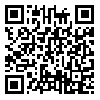BibTeX | RIS | EndNote | Medlars | ProCite | Reference Manager | RefWorks
Send citation to:
URL: http://tumj.tums.ac.ir/article-1-976-en.html

 , F. Hajiabolhassan
, F. Hajiabolhassan 
 , M. Naraghi
, M. Naraghi 
 , M. Sedaei
, M. Sedaei 
 , E. Entezari
, E. Entezari 
 , M. Haddadi Avval
, M. Haddadi Avval 
 , P. Kamali
, P. Kamali 

Background: The purpose of this study was to identify variables affecting outcome in patients with benign paroxysmal positional vertigo (BPPV) treated with canalith repositioning maneuver (CRM).
Methods: This interventional study was conducted on 58 patients (14 males, 44 females, mean age 48.12+13.22) referred to the Vertigo Rehabilitation Clinic of the Rehabilitation School of Tehran University of Medical Sciences from 2002 to 2004. All patients were treated with CRM. According to the treatment efficacy the patients were allocated in three groups: completely treated, partially treated, and not treated. The effect of factors including age, sex, etiology, duration of BPPV, unilateral or bilateral disease, number of maneuvers, and number of sessions on outcome in patients was evaluated.
Results: Forty-nine patients (84.5%) were completely cured. Age, sex, etiology, and duration did not significantly affect the treatment outcome. Unilateral BPPV can be treated significantly better than bilateral BPPV. Forty-seven patients who were completely treated needed 1 session and thirty-seven of them required 2 maneuvers.
Conclusion: CRM is significantly effective for BPPV treatment. Treating unilateral BPPV is expected to be easier. As most of the patients will be cured by 1 or 2 maneuvers or in 1 session, patients who required more sessions or more maneuvers may not be completely treated.
| Rights and permissions | |
 |
This work is licensed under a Creative Commons Attribution-NonCommercial 4.0 International License. |



